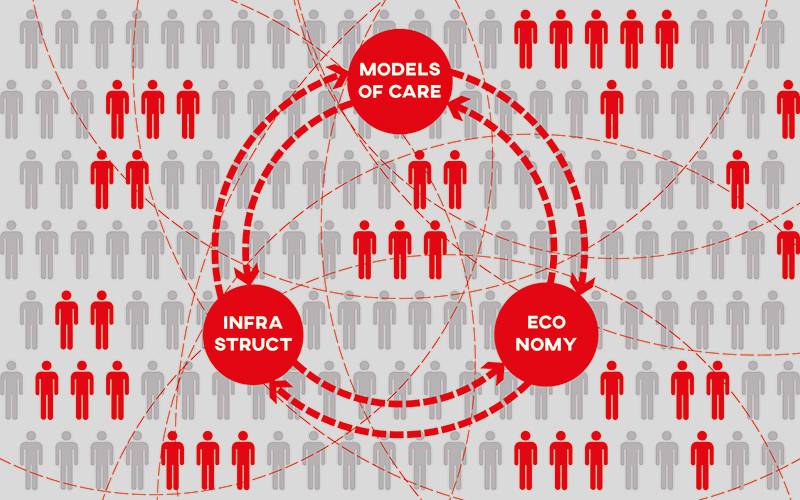 Research
Research

Subject
A Simulation Framework to Form Collective Intelligence in Strategic Health Infrastructure Planning
First and second supervisors
Abstract
Planning built infrastructure for health systems is a complex process that requires a better understanding of clinical, resource and financial interdependencies. At regional strategic scale, health and social care organisations are required to provide coordinated services by working on a unified plan in response to the objectives set out by the government.
The complexities of objectives, of structure and of process make this a fragmented and lengthy process, stressing the need for integration across discipline and organisational boundaries. Forming a collective intelligence between stakeholders could potentially lead to an accelerated process and higher quality results over the long term.
In this context, simulation tools have the potential to bridge gaps and enable collaborative processes across institutions. However, evidence shows that simulation tools could also hinder the planning process by turning the focus away from the artefact and towards the tool. Alexandru's research asks: can a simulation framework enable organisations to form a collective intelligence and achieve an integrated strategic process to plan infrastructure for a regional health and social care service?
This work proposes a simulation-based framework that integrates strategic health infrastructure planning with clinical and financial planning processes from inception to the point of selecting the preferred option. The multi-method simulation tool would federate individual artefacts and engage stakeholders in group modelling activities.
Firstly, it would be an exploration and negotiation tool with the purpose to create a common ground. Towards the end of the planning process, it would be used to evaluate the impact of combined the proposals on the wider health system and on the long-term infrastructure provision. It is estimated that the additional opportunities for collective behaviour could lead to the formation of a collective intelligence in strategic health infrastructure planning.
Biography
Alexandru’s work engages the collective intelligence of the group to solve the complex challenges of health infrastructure planning and design. His research stems from collaborative design, having previously developed the Collective Intelligence Support Protocol to deliver an award-winning design by an international team of 11 people working remotely. Living Grounds, which he coordinated, won second prize out of 1,749 submissions at the 2014 Jacques Rougerie Competition, supported by UNESCO.
As a healthcare architect at Medical Architecture, Alexandru currently works on major hospital infrastructure in the UK. In previous roles in Paris and London, he gained international healthcare experience, with projects undertaken in France, Morocco, and Liberia. He started university in Bucharest, finished his Master’s in Paris, and is currently undertaking a PhD at The Bartlett School of Architecture. Having learned about the dynamics of capital investment, clinical pathways, and long-term estates planning, he questions the possibility of a simulation-driven integrated planning process.
Links
- Publications
A. Senciuc (2018). “The need to harness collective intelligence in strategic health planning” – research poster in the European Healthcare Design 2018 Conference, London.
A. Senciuc (2018). “Collective intelligence in strategic health planning” – research poster.
A. Senciuc, I. Pluchinotta, S. Ben Rajeb (2015). “Collective intelligence support protocol: a systemic approach for collaborative architectural design”, in Luo Y. (ed.), Cooperative Design, Visualisation and Engineering CDVE 2015 Proceedings, Lecture Notes in Computer Science 9320, Springer-Verlag Berlin Heidelberg, pp. 152-161.
S. Ben Rajeb, A. Senciuc, I. Pluchinotta (2015). “ShareLab support for collective intelligence. 1 deadline, 11 designers, 1 project” in the Fifth International Conference on Advanced Collaborative Networks, Systems and Applications, COLLA 2015 Proceedings, Malta, IARIA XPS Press, pp. 27-33.
A. Senciuc, C. Lecourtois (2013). “Exploring collective architectural conception. Cooperation, coordination and collaboration via basic online tools”, in Y. Luo (ed.), Cooperative Design, Visualisation and Engineering CDVE 2013 Proceedings, Lecture Notes in Computer Science 8091, Springer-Verlag Berlin Heidelberg, pp. 51-55.
Image: Concept for a simulation-based integrated planning framework ©Alexandru Senciuc
 Close
Close

